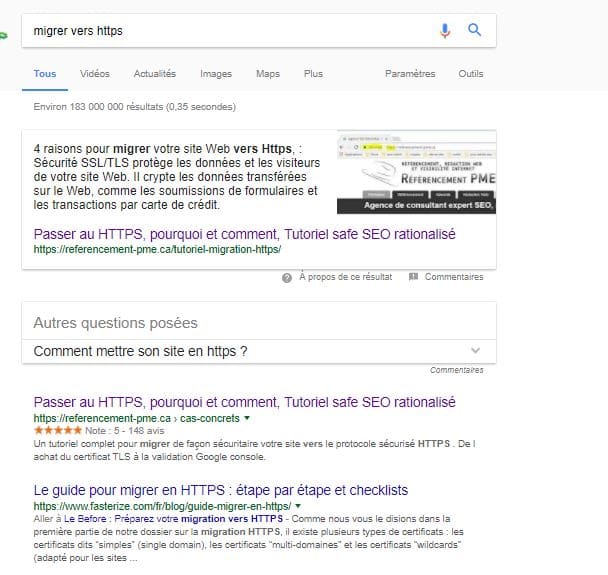After the change of meta title from 155 to 165 characters or so last year, it is the meta description that benefits from more visibility in the Google search results page (SERP ).
Google has confirmed with Search Engine Land the change in the display of snippets in search results. The snippet is the description of the page that is located under the URL (in green) in an organic search result and that summarizes or promotes the content that relates to the search query.
A Google spokesperson says:
We have recently made a change to provide more descriptive and useful snippets, to help people better understand the level of relevance search/result proposed. This gives rise to a lengthening of the extracts.
Here’s a screenshot that highlights elongated meta description snippets in a search result on Google.ca:
An example with the request “migrate to https“
We notice that this lengthening is contextual, not all sites benefit from it, Google appreciates each meta description individually.
We already knew that this tag was lengthened during long or extra-long queries, which can go up to more than 400 characters, but this time Google is looking to enhance the page by recomposing this snippet with text from the article on short queries.
Note that the excerpt from fasterise.com displays:
Migrating to HTTPS: the risks to be expected, the benefits to expect Google is pushing websites to adopt a more secure protocol on all their pages. Three SEO consultants share their technical tips for successful SEO
Which corresponds to the title <h1> + the first words of the article
While the meta description proposed in the source code is
<meta name=”description” content=”Google is pushing websites to adopt a more secure protocol on all their pages. Three SEO consultants share their technical advice for a successful operation. ” />
In this results page, in addition to the zero position, we also notice the presence of the “google also ask“ results deployed in Canada in French since mid-November 2017, even though no questions are asked in the query. Google therefore interprets the query as a question … To be followed very much in the future, because these answers push the natural results even lower…
Confirmed by several SEO analysis centers
This month, a number of U.S. articles mention the fact that meta description size was becoming longer and longer… RankRanger are one of them, their tools show that the size of the snippet has gone from 165 characters to sometimes 340 characters .
What can be done in the face of this development?
Wait a little and see if the principle becomes widespread
(update 6 January 2018)
- First, take the meta descriptions of the pages that rank well and push them to 320 characters
- Rework the others so that they are as explicit as possible because keeping control of them is probably the best practice for a conversion.
- Take care of the h1 tag <and the chapter of your articles (proofread and structure your onpage)>
This will not necessarily prevent Google from dynamically generating the meta according to its “will” but it is clear that yours will be more relevant and more correlated with the content.
Work the chapter of your articles because we notice that Google often uses the first words of a page to build its meta description on the fly.
Google can edit a meta description. If yours doesn’t seem relevant but your article answers the query, the engine then displays part of the text of your web page.
Other observations show that, Google keeps the already existing description if it is at the new standard. Sometimes Google will keep your meta and add extra text. In principle, all cases are possible, but the best practice is to work on this small piece of text in order to keep control of it.
Google will probably further evolve its format and make the 165-character snippets disappear. By choosing long descriptions, at least 230 characters, but you can overflow… you give yourself a better chance of Google displaying it without changes or additions.
Onpage analytics tools lag behind
And don’t worry about automated analytics tools that will cry wolf and deem your meta too long… they are only machines that are rarely up to date.
Beyond the news that indicates that you need to lengthen your meta descriptions, remember that they will be less and less respected by search engines if they consider that another part of the article is more relevant to the query asked.

